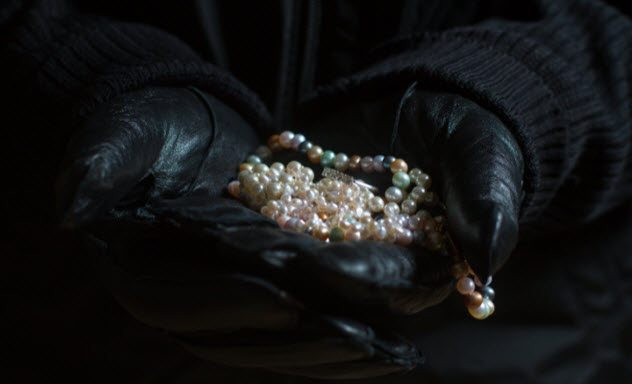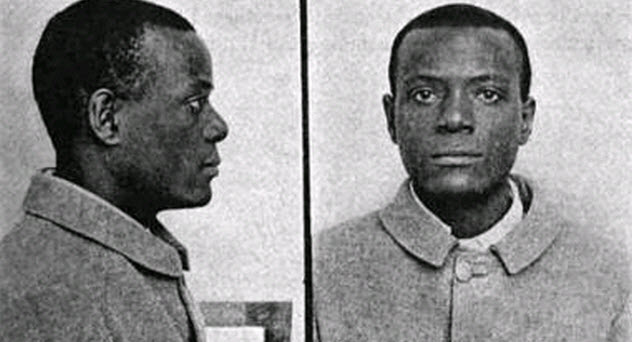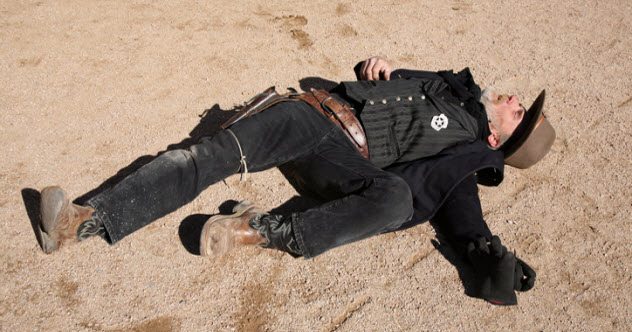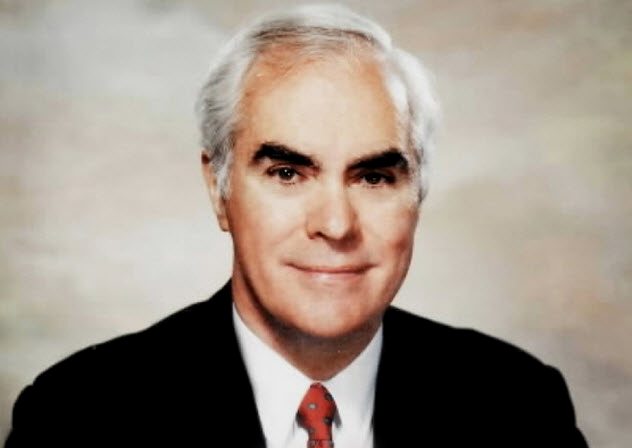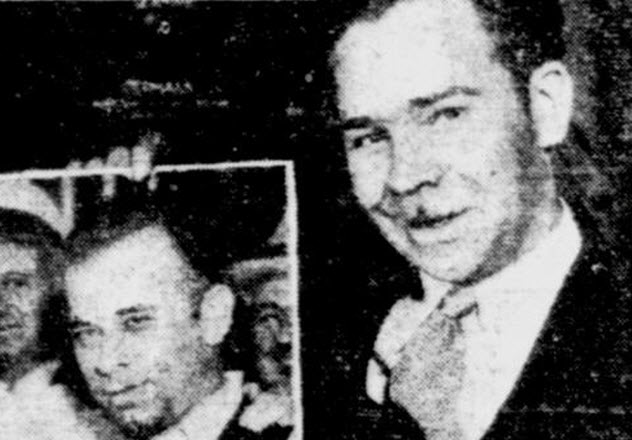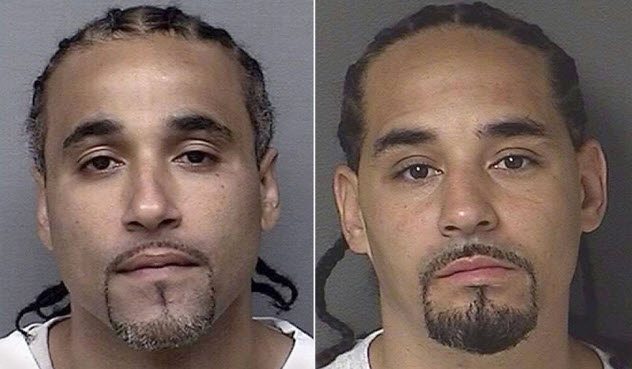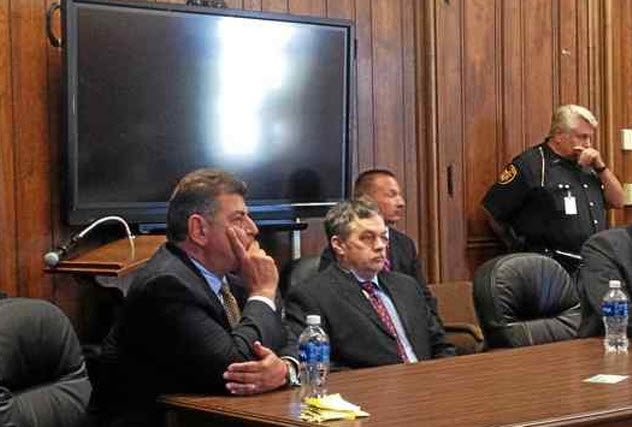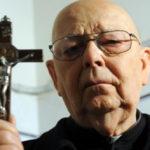The story spun in a different direction when the vet realized that the supposed gorilla was actually a human in a gorilla costume. Apparently, the zoo had been holding a gorilla escape drill. One of its workers had dressed in a gorilla costume and pretended to be an escaping gorilla. This would have been a hilarious case of mistaken identity except that the zoo later debunked the story. While they did agree that one of their staff members was shot by a veterinarian during a gorilla escape drill, they clarified that he was neither in a gorilla costume nor pretending to be a gorilla and had only been shot by mistake. Nevertheless, here are 10 actual cases of mistaken identity.
10 Guy Goma And Guy Kewney
In 2006, Apple Inc., the maker of the iPhone, was involved in a legal battle with Apple Corps, a record label owned by the Beatles. The British Broadcasting Corporation (BBC) decided to air a special on the lawsuit, so they invited Guy Kewney, a technology writer and Internet expert for an on-air interview. The day that Guy Kewney arrived at the BBC London studio for the interview happened to be the same day that another man, Guy Goma, arrived at the same London office for a job interview. BBC staffers mistook Guy Goma for Guy Kewney and began making him up and wiring him with a microphone in preparation for the live interview. While this happened, Guy Goma thought that he was being prepared for his job interview and only realized what was happening when the supposed “interview” began. The look on his face at that moment was priceless. However, he managed to maintain his composure even though his replies were incoherent. When asked whether he was surprised about the verdict of the legal battle, he replied, “I’m very surprised to see this verdict come on me. I was not expecting that.” Sure, he was not expecting it. He did not get the job, either.[1]
9 Adolf Beck And John Smith
On the evening of December 16, 1895, 54-year-old Adolf Beck stepped out of his London home only to meet an unknown woman who accused him of stealing her jewelry three weeks earlier. He denied the allegation but fled when she started to call him a thief. The woman, Ottilie Meissonier, chased after him until they met a police officer who took them to the Rochester Row police station. Officers at the station matched the robbery to that reported by another woman, Daisy Grant, a few months earlier. They invited Daisy and Meissonier’s maid, who had supposedly seen Beck when he defrauded her mistress, to identify him in a lineup of seven men. The women fingered Beck as the thief. After the newspapers reported the incident, more women came forward with similar accusations and identified Beck as the criminal. He was subsequently recognized by different women when standing in lineups of eight, 14, and 18 men. A handwriting specialist even studied Beck’s writing and claimed that it was a modified version of the one he used for fraud. Beck stood trial and was sentenced to prison for seven years. Released in 1901, he remained a free man until 1904 when another woman accused him of stealing her jewelry. More women accused him of similar crimes and even identified him from several lineups. Beck was sentenced to prison for another five years. This time, however, luck shone his way as the real criminal was caught 10 days into Beck’s second imprisonment. The look-alike was a man who called himself John Smith even though his real name was believed to be Frederick Meyer. Beck and Smith looked alike but not so much that they could not be differentiated. Yet, 16 women misidentified Beck as Smith. Beck was freed and given £5,000 for his sufferings. Meanwhile, Smith was sent to prison. This incident changed British criminal law and is the reason that suspects are not convicted based on eyewitness accounts alone.[2]
8 Will West And William West
Before fingerprinting became the norm, security and prison agencies depended on the Bertillon system, which used the measurements of several parts of a person’s body to identify criminals. The Bertillon system was thought to be foolproof until 1903 when an inmate called Will West arrived at prison in Leavenworth. Will’s measurements were taken just like any other prisoner until a prison worker claimed that Will had been incarcerated at Leavenworth before. Will denied it, and the clerk provided Will’s file based on his chest measurement. It was at this moment that things went south. The file not only contained Will’s measurements but also his picture and name, which was written as William West. Even Will agreed that the picture was his. But he could not understand how the prison had obtained it since he had never been there.[3] As it turned out, Will and William were look-alikes. The incident forced the government to reconsider the effectiveness of the Bertillon system and the possibility of switching to fingerprinting.
7 Laura Van Ryn And Whitney Cerak
On April 26, 2006, Robert Spencer was driving on a highway when he fell asleep at the wheel and crashed his truck into a school van in the opposite lane. Four students and one staff member of Taylor University in Indiana were killed in the van. Among the dead students was Laura Van Ryn, whose body was mistaken for that of Whitney Cerak, who survived but was seriously injured. Believing that their daughter was dead, Whitney’s distraught family buried Laura’s body while Laura’s family watched over Whitney as she recovered, thinking she was Laura. The mix-up was discovered after “Laura” awakened from a coma and identified herself as Whitney. Apparently, both ladies had blonde hair and similar features even though they could be easily differentiated. The mix-up happened because emergency medical services mistook Laura’s ID for Whitney’s. The mistake was not detected earlier because Whitney’s head was bandaged before she was taken to the hospital. Whitney returned to school four months after the accident while Spencer, the truck driver, was sent to prison for two years.[4]
6 Thomas Berdue And James Stewart
James Stewart (aka “English Jim”) was an infamous California outlaw who was active between the 1840s and the early 1850s. In December 1850, he was arrested for murdering and robbing a sheriff of about $4,000. Stewart escaped from detention but was rearrested in February the following year. This time, he was sentenced to 14 years imprisonment and, later, death for killing the sheriff.[5] Stewart denied the allegations leveled against him, not because he was afraid of owning up to his crimes but because he was an innocent and unfortunate look-alike named Thomas Berdue. In one of the most bizarre coincidences ever, Berdue had an incomplete left forefinger and a scar above his left eye and ear, just like Stewart. The only reason Berdue was not executed was because the execution was postponed several times. His problems came to an end when the real Stewart was arrested after a failed ship robbery in July 1851. Stewart never denied his crimes and was executed within two hours after sentencing. Berdue was released from prison and given $2,000 for his trouble. He left California after the incident.
5 Robert P. Casey, Robert E. Casey, And Another Robert P. Casey
Robert P. Casey was a top Democratic Party member and Pennsylvania politician. He was very active in Pennsylvania politics, where he served as a state senator, the state auditor general, and the governor. He was also popular. So popular that voters elected the similarly named Robert E. Casey as state treasurer in 1976 because they thought he was Robert P. Casey. Robert E. was a county official who rode on Robert P.’s popularity and spent a mere $1,000 on his campaign. This sort of incident was not an isolated one for Robert P. Casey. During another election, a schoolteacher and ice cream seller named Robert P. Casey ran on the Democratic Party’s ticket for Pennsylvania lieutenant governor to the detriment of the real Robert P. Casey, who was running for governor at the same time. To prevent a repeat, the real Robert P. Casey used “The Real Bob Casey Committee” as his tagline for his successful 1986 election as governor.[6]
4 Ralph Alsman And John Dillinger
In the US, John Dillinger was an infamous outlaw who terrorized the Midwest during the Great Depression. Along with his gang, he robbed, wounded, and killed at will. He also raided banks and police armories and broke out of jail three times. In 1934, the US authorities launched a manhunt with a special order that Dillinger should be shot to death when he was spotted. This became a problem for Ralph Alsman, Dillinger’s unfortunate look-alike. Both men also had moles near their eyes, cleft chins, and scars on their left wrists. Alsman was arrested 17 times in several cities by security agents who mistook him for Dillinger. Several of the arrests were close calls. In one incident, three machine guns were aimed at Alsman. In another incident, he was awakened from sleep with a gun aimed at him and almost touching him. Luckily, though, he was never shot.[7] Alsman’s problems came to an end on July 22, 1934, when three FBI agents shot and killed Dillinger as he left a theater.
3 Richard Jones And Ricky Amos
On May 31, 1999, Richard Jones was in his Kansas City, Missouri, home celebrating Memorial Day and his girlfriend’s birthday. At the same time, in Kansas City, Kansas, Ricky Amos and his gang had snatched a lady’s phone at a Walmart store. The lady and the security guard at the store could not facially identify Ricky, who had committed the actual robbery. However, they knew he was a slim, light-skinned black or Latino. Based on this description, police arrested the innocent Richard Jones. He was convicted and sentenced to 19 years in prison. Richard Jones was 15 years into his 19-year sentence at a Kansas Department of Corrections facility when his fellow inmates made him aware of a look-alike in the same prison. The look-alike was Ricky Amos, who was discovered to be the real robber. Richard Jones and Ricky Amos looked a lot alike. They had dark eyes, thick eyebrows, and similar complexions. They also braided their hair, sported goatees, and were nicknamed Rick. Richard Jones was finally set free after spending 17 years in prison for a crime he never committed.[8]
2 Daniel Ott And Daniel Ott
On May 26, 2006, Chad South entered Daniel Ott’s home in Burton Township, Ohio, and shot him dead. South was a hit man and had been working for Joe Rosebrook, a criminal who ran a chop shop where he tore down stolen vehicles and sold their parts. Ott was a car thief whom Rosebrook had hired earlier to murder an associate, Curtis Frazier. Instead of killing Frazier, Ott snitched on Rosebrook, who was sent to prison in 2004.[9] The murder of Daniel Ott by Chad South would have been Rosebrook’s revenge except that South killed the wrong Daniel Ott. The only similarity between both Daniels was their name and the fact that they lived in Ohio. Rosebrook and his accomplices were charged with Daniel Ott’s murder after nine years of investigations.
1 Alfred Nobel And Ludvig Nobel
Alfred Bernhard Nobel is remembered as the founder of the Nobel Prize, which includes the famous Nobel Peace Prize. Ironically, he is also the inventor of dynamite, a deadly explosive used for variety of purposes, including warfare. To be fair, Alfred Nobel invented dynamite for use in mining, demolition, and construction and not as a weapon. Nevertheless, the military found other purposes for the deadly explosive and Alfred never openly supported nor condemned its use in warfare. Alfred Nobel rethought his invention when Ludvig, his brother, died in 1888. Newspapers erroneously published Alfred’s obituary and accused him of becoming wealthy by killing people. One newspaper even announced his death with the headline “The Merchant of Death is Dead.”[10] This devastated Nobel. Wanting to repair his name, he willed a huge chunk of his wealth to create the Nobel Prizes.

